- Home
- Aharon Appelfeld
All Whom I Have Loved Page 3
All Whom I Have Loved Read online
Page 3
And so the night passed. The next day, a slim young Ruthenian girl came to us, and Mother said, “This is Halina. Halina will look after you and play with you. I'm starting to teach.”
Mother showed Halina the kitchen and the bedroom and said, “Paul loves to take walks. Take him for walks in the streets and in the fields.” Then she picked up her briefcase, kissed me on my forehead, and left. I was in shock, and I didn't see her go out.
My mother tongue was German, and Halina spoke Ruthenian. She knew a few words of German and laughingly ticked them off on her fingers.
I stared at her, and it seemed that this was still the dream from the night before, that I was alone in the world among strangers, and that the person who had been brought to take care of me spoke a language that I didn't understand. “Get out of here,” I wanted to shout, but I choked and burst into tears. Halina tried to calm me. She cavorted and jumped up and down, she imitated birds and frogs, but the tears that were stored in me grew stronger and stronger. To distract me, she knelt down and wept with me, but even this ruse did not calm me.
I stood there and wept, and the tears seemed to flow back into me. Eventually I grew tired and fell asleep on the floor. When I awoke and saw Halina, I let out a shout. Halina must have been frightened, because she took me outside. “Take me to Mother! I want my mother!” I yelled, drumming my legs on the ground. Unfamiliar neighbors gathered around and tried to calm me, but I was so immersed in my tears that their every word only stoked my rage. Eventually they said to Halina: “There's no choice, take him to his mother, take him to the school.”
I wailed all the way to the school. Everything was a blur, but I did see the two-story building and the yard full of noisy children. My crying amused them, and they made fun of me. Halina scolded them and pulled me toward the teachers' room.
Mother saw me and was shocked. In her panic she let out a cry that sounded like she was choking. I was completely overcome with weeping and anger, and I lay on the floor, kicking my legs. Mother knelt and said, “I'm here, my love.” The words barely penetrated my ears. Finally I got to my feet and dragged her outside. Mother didn't resist but let herself be dragged along behind me. I saw she was clenching her jaw, but she didn't rebuke me. The entire way home she tried to distract me by saying things to me, and at the kiosk she bought me an ice cream. Halina stood as if she had been reprimanded, ready to do as she was told. Mother asked her something in her language, and Halina shrugged and said, “What could I do?”
Halina went on her way, and Mother and I entered the house. Mother sat by the table and said nothing of my behavior. I felt that she was waiting for me to come to her and apologize, but something in me refused to do this. Mother went to prepare lunch and I sat on the floor. Suddenly I heard her say, “You'll have to get used to it.” To get used to it—I'd already heard this cold expression, but this time it sounded like ice falling from the roof in the winter.
“Mother.”
“What?”
“When is Father coming back?”
“I don't know.”
We ate dinner in silence. A wall of silence had suddenly sprung up between Mother and me. Toward the end of the meal, Mother tried to placate me, but I felt that her words came from her lips and not from her heart. Before going to sleep she said, “I have to go to work. I have no choice. You're a big boy and you understand.”
When I didn't respond she began to cry. In the city she would sometimes cry over Father's behavior, about his wastefulness and the times he didn't come home. But this was a different kind of weeping; it was sharper and more bitter, as if she were saying, “You, too? You're ganging up with your father so as to hurt me?”
I didn't know what to do, and I knelt down.
“Don't make it so hard for me,” she implored.
“I won't make it hard.”
“I'm a new teacher and everyone's watching me.”
“I won't cry, I promise.”
Mother dried her eyes. Her face, which had become swollen from her tears, returned to itself, and she said, “What can I do? I have to go out to work. There's no one to support us.”
Her words sounded rehearsed, but the more she said, the clearer it became that I would not be able to stop the nanny from coming the next day. So as not to show how much it hurt me and to please her, I said, “Don't worry about it, Mother. I'll go to the park with Halina.”
9
The next day I stood by the door and said good-bye to Mother. I did not cry. I felt the anguish of parting later, in the bedroom, amidst the rumpled bed and scattered clothes. It was a sunny day, and the yard behind the house was filled with light. We went out, and Halina immediately began to show me her wonders: she walked on her hands and then made noises like the cawing of crows; she imitated sheep and cows, frogs and cuckoos. And for a moment she seemed to be not a person but an amazing animal that knew how to do everything that animals can do: to climb trees nimbly, to crawl, to leap over fences, and to fly. Halina lost no time in trying to teach me her skills, but I was far from agile and scarcely capable of producing a single whistle.
Then we rolled in the grass. Halina was slender and very nimble. I tried hard to catch her, but she ran fast and could hop like a rabbit. I stared at her and I knew: I would never be able to do the same.
And so the day passed. The pain of parting from Mother had pierced through me, but Halina was so entertaining that as the time passed I no longer felt it. When Mother returned home, I was playing marbles with Halina and I didn't hear her footsteps. She came in, immediately threw her briefcase onto the floor, and sat down on the sofa. As she stretched out and leaned back, she said, “How was it?”
“We played.”
“You didn't take a walk?”
“We took a walk.”
The following day Halina repeated her tricks. We had a midmorning snack, then we left for a walk along the main street, and from there we went down to the market. Now I saw the Ruthenian peasant women up close. They had spread out their vegetables and fruits on sacking and on low stalls. Some of their fowl were trussed up, and most were in cages. I saw them and it pained me.
And so the morning passed. Halina would point to something and ask me its name in German. She found it hard to pronounce the words that I taught her. Everything amused her and she laughed. I found it hard to laugh, even when I was rolling in the grass.
Mother came back from the school tired, her face as pale as chalk. She told me about the children who came from the villages, who found it hard to learn and were disruptive. The vestiges of anger could still be seen in her face, and for a moment she closed her eyes and rested her head on the back of the chair.
We ate a late lunch on the porch. At this time of day, the porch was still filled with light. I wanted to make Mother happy, but I wasn't sure how. I told her that I was at the market but didn't tell her about the trussed chickens so as not to make her sad.
In the afternoon we stayed in the house. Mother lay on the bed, a cloth to her forehead. The headaches that she used to get in the city had now returned, with greater ferocity. She lay without uttering a sound.
When the light dimmed I went outside and approached the yard that faced our backyard, where the bearded Jews would gather. Up close, I saw that they were not only different in the way they dressed but in their movements, too. They seemed to have a secret, and to move this secret from hiding place to hiding place. When the secret was well hidden they went inside to pray. Their prayer was noisy and sometimes they shouted. It didn't go on for long, and afterward they gathered again in the yard. Darkness fell and blackened their faces. I very much wanted to go in there and touch their secret, but I was afraid. I feared that if they touched me, I would get a rash, like the one I'd had in the winter.
I went back and asked Mother about the bearded Jews, and she explained to me that they were old Jews, and that their way of life was different from ours. It was hard for me to really understand her and yet I did pick up some of what she'd said. Mother wa
s so occupied with things at school that her heart, I felt, was no longer with me. She was up till late at night, correcting exercise books and preparing posters. Sometimes she fell asleep in her clothes, without putting out the light.
Finally, I summoned up the courage to go into the yard of the bearded Jews. Surprised, they gathered around me and asked what my name was and where I lived. I told them my name and pointed to the house.
“You live right next to us,” they said in amazement. One of them took a piece of candy out of his coat pocket and gave it to me. From up close, they were not so short. They spoke a jumbled language, with a strange pronunciation, and they swallowed their words. But I still understood some of what they were saying.
“Where are you from?” one of them asked.
I told him.
“And how long will you live here?”
“Always.”
When they heard this, they were amused, as if I had told them something funny. “And what are you doing?” I asked, and was immediately taken aback by my own question.
“We are praying. Do you want to pray?”
“I don't know how.”
They stared at me and I stared back at them. Eventually one of them said to me, “Go back home, child, your mother must be worried.”
I went back to the fence, bent down, and put a leg over the post. I was in our yard. It was so different from theirs, it was as if I had returned from another city.
I told Mother about the visit. She lifted her head up from the notebooks and did not scold me.
“Are they Jews?” I asked, even though she had told me that they were.
“That's right.”
“And what's the difference between the old Jews and the new Jews?”
“The old Jews believe in God and pray to him.”
“And new Jews don't believe in God?”
“No.”
Usually when Mother explained something she would go into detail, but this time she made do with one word and then buried her head in the pile of notebooks. Ever since she'd started teaching she'd become tired and distracted, and I felt that her enthusiasm had been dampened. But she kept repeating that one can't be tough with the village children, for their lives were harder than ours.
10
Yesterday Mother turned twenty-nine, and the two of us celebrated her birthday on the porch, at the round table that was covered with a white tablecloth. Mother was in high spirits; she lifted a glass of wine and made a toast: “To living!”
When Mother is filled with enthusiasm, her beauty shines out, and I feel sad that she has to spend most of the day in school with the unruly peasant children and about the headaches that don't leave her alone. To make her happy, I told her about Halina's feats: how she skipped, and how she imitated things. Mother listened but said nothing, and for a moment it seemed that my words did not touch her. It was a mistake, of course. What I said made her glad, for she immediately promised me that during Christmas vacation we would travel to the Carpathian Mountains.
“Are there rivers in the Carpathians?” I asked.
“There certainly are, but in the winter they're frozen over.”
“And what will we do there?”
“We'll ski.”
The word “ski” had such a wonderful sound that I immediately pictured the high hills, and Mother and I in winter coats, borne along on gusts of wind and floating over the surface of the white snow.
After the meal we went for a walk. It was a pleasant evening, wet from the afternoon rains, and we took the dirt track to the fields. At this time of the year the fields were gray and sad, and a kind of dull lowing rose from the dark valleys. Suddenly Mother went back to talking about the crowded classes at the school, the noise, and the uproar in the corridors.
We made our way back along the avenue of chestnut trees that led from the fields to the city. The trees were already bare, and their large leaves lay on the ground yellow and trampled. The farther we went, the more the damp evening seemed to bring to mind other evenings, but where and when I do not know. Since we'd left Father in Czernowitz, it was as if my life had been torn in two. Sometimes it seemed that I was walking with him and breathing in his silence and the scent of his cigarettes.
Suddenly the lights of evening turned red, and I saw Father standing next to me, and it wasn't only him I saw but the street that leads to the tavern as well. But then people were addressing him, and he wasn't answering. Speech was frozen in him, and only when the waitress had served him his third drink did a thin crack of a smile spread across his face, and he called out: “To all those who sit in taverns, and to all those wretched people who have never tasted a drink.” On hearing this, the waitress burst out laughing and said, “Where did you get that toast from?”
“From the heart.”
For a moment I was very indignant that on Mother's birthday my thoughts were with Father. “Mother,” I said, wanting to apologize.
“What, my love?” Mother asked tenderly.
“I love you so much.”
“Me, too,” she said, and kissed my head.
When we returned home, Mother got another one of her headaches. She lay on the bed and I sat next to her. When she had these headaches, I wouldn't speak to her. I gazed at her breathing and at her hair gathered behind her. For a long time I sat and gazed at her, and eventually I fell asleep.
The next day Halina came wearing an embroidered linen dress. She had already learned some words of German and I some words of Ruthenian, but it was hard for us to speak. I told her about Mother's birthday and about the evening walk along the avenue of chestnut trees. The story did not impress her. Her thoughts were usually on birds; they were not afraid of her, and they would come to peck seeds from her palms. She would stroke them and speak to them, and put them on her shoulders. They were in no hurry to fly away.
“Halina, what language do you speak to them?”
“Ruthenian.”
“And they understand?”
“Every word,” she said, and burst out laughing.
Her eyes and hands were more fluent than her mouth. With her hands, she explained many things to me. Her gestures no longer seemed strange. I noticed that around her neck she wore a chain with Jesus on the cross. I had seen the crucified Jesus Christ on my walks with Father when we visited the chapels. I asked Father a lot about him and his crucifixion. Father's explanations were so abrupt that it was hard to understand them.
“What's this?” I asked Halina, and I pointed to the cross.
She raised her hand and with a finger pointed to the sky.
“He's God? Really?”
It was hard for me to understand how God, who's so mighty, could squeeze himself down into a simple likeness, so He could be worn around someone's neck. I wanted to ask her about this, but I didn't know how.
Later Halina surprised me and asked, “How old are you?”
I told her.
“And why don't you go to school?”
“I have asthma.”
“What is asthma?”
I told her.
“You poor thing.”
I'm not a poor thing, I was about to say.
“How many years have you had the illness?” she asked.
“From childhood.”
“And are you suffering right now?”
“Now I'm breathing like a bird.” I tried to impress her.
My mysterious illness was a secret between Father and myself. In my early childhood, a doctor diagnosed asthma. Father latched on to this and had me exempted from school. Apparently Mother was against this, but Father returned triumphant from the Ministry of Education: “I've got Paul exempted from the house of slavery.”
I was then six years old. Many events have been erased from my memory, but not the sight of Father on his return from the Ministry of Education. For he had freed me not only from school but from all the hardships that awaited me in life.
11
Even as autumn darkens the windows of the house, Mo
ther tells me that from now on she will also be working in the afternoons, and Halina will look after me all day. I do not ask why. Halina is pleasant company; we play hide-and-seek and entice birds to us with crumbs of bread, we play on the main street and in the fields, and when it's not raining we go to the river. By the time Mother returns at night, I'm so immersed in our games that I scarcely notice her.
Halina tells Mother what we've done and what I've eaten. In the afternoon she bathes me in a large tub, puts me on her knees to dry me, and declares, “Such a nice strong boy, all the girls will want to kiss him!” Then she sinks her mouth into my upper arms and my thighs and adds, “Very tasty, the tastiest.”
This hurts a little but it is not without pleasure. She dresses me in a sailor outfit.
Every day Halina learns new words and immediately uses them; I learn, too, but not as fast. Sometimes we sit on the banks of the river and talk. Halina lives in a village near Storozynetz, and she has a fiancé. The fiancé is in the army, and she plans to marry him when he is released.
“Is he handsome?” I ask.
“Yes, he's handsome,” she says, and for some reason it hurts me.
“When does he come?” I ask her.
“From time to time.”
That is a slight consolation. I feel that I have already known Halina for a long time—since my walk with Father along the banks of the Prut, when I saw the girls doing their washing on its banks, except that then she was distant and unattainable and now she is so near me, I can touch her neck.
Mother has changed over the past weeks: she still complains about headaches, but less frequently. Now a hidden smile plays on her lips. She sits and corrects notebooks late into the night.
“What's happened, Mother?” I have to ask.

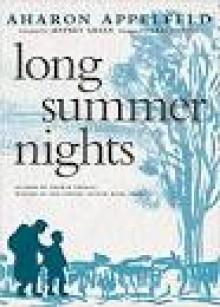 Long Summer Nights
Long Summer Nights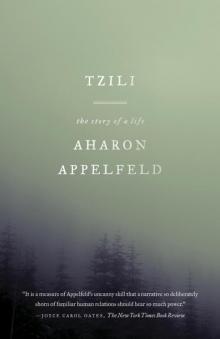 Tzili
Tzili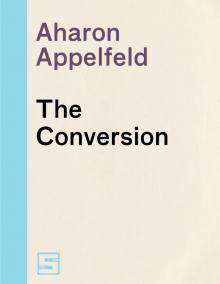 The Conversion
The Conversion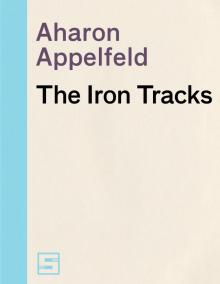 The Iron Tracks
The Iron Tracks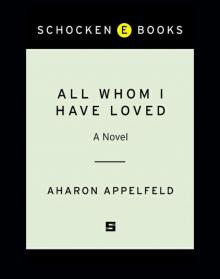 All Whom I Have Loved
All Whom I Have Loved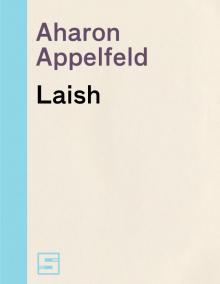 Laish
Laish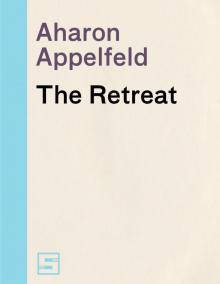 The Retreat
The Retreat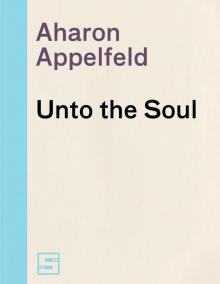 Unto the Soul
Unto the Soul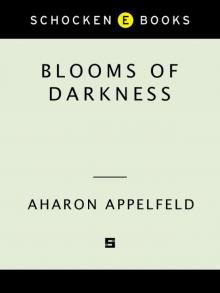 Blooms of Darkness
Blooms of Darkness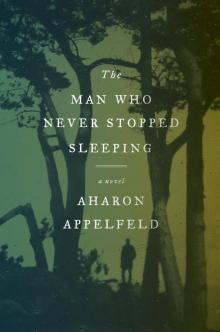 The Man Who Never Stopped Sleeping
The Man Who Never Stopped Sleeping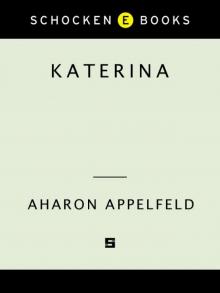 Katerina
Katerina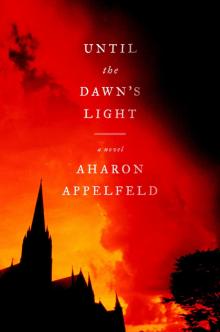 Until the Dawn's Light
Until the Dawn's Light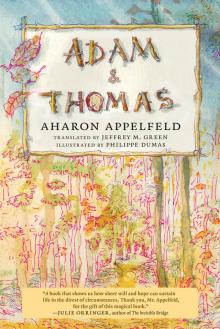 Adam and Thomas
Adam and Thomas Suddenly, Love
Suddenly, Love